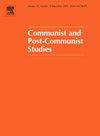Compliant Subjects?
IF 1.3
4区 社会学
Q3 INTERNATIONAL RELATIONS
引用次数: 1
Abstract
The Crimean Tatars, a Muslim Turkic ethnic group, remain the most oppressed group in Crimea after the 2014 Russian annexation. The Ukrainian public tends to view them as obedient victims forced to accommodate Russian demands, while scholars mainly avoid the issue. My ethnographic fieldwork in Crimea, however, demonstrates that what might seem like obedient behavior from the outside is, in fact, an expression of agency. This reading is based on close-range observations and conversations with people who speak and behave in ways that initially appear as compliant acts, but which do in fact challenge Russian authorities—arguably more so than other overt forms of resistance in this context. I argue that the ability to decipher many Crimean Tatars’ behavior as tactics of resistance, depends on our understanding of authorities’ contrary expectations. Portrayed as religious fanatics and a security threat, Crimean Tatars are stereotyped as terrorists, likely to engage in extremist activity. In light of this, Crimean Tatars’ compliant behavior, expressed through patience and etiquette, festivity and humor, proves that narrative wrong. Furthermore, other seemingly compliant behaviors—such as accepting Russian passports in order to remain in Crimea—should be interpreted as an act of resistance to the political aims of state actors. By undermining the state’s aim to push out Crimean Tatars and increase the Slavic population, the decision to remain in Crimea in fact challenges state power, rather than affirms it.合规受试者?
2014年俄罗斯吞并克里米亚后,穆斯林突厥民族克里米亚鞑靼人仍然是克里米亚最受压迫的群体。乌克兰公众倾向于将他们视为顺从的受害者,被迫满足俄罗斯的要求,而学者们则主要回避这个问题。然而,我在克里米亚的民族志实地调查表明,从外部看起来顺从的行为,实际上是一种能动性的表达。这篇文章是基于对人们的近距离观察和对话,这些人的言行最初看起来像是顺从的行为,但实际上确实挑战了俄罗斯当局——可以说,在这种情况下,他们比其他公开形式的抵抗更具挑战性。我认为,能否将许多克里米亚鞑靼人的行为解读为抵抗策略,取决于我们对当局相反期望的理解。克里米亚鞑靼人被描绘成宗教狂热分子和安全威胁,他们被定型为恐怖分子,很可能从事极端主义活动。有鉴于此,克里米亚鞑靼人的顺从行为,通过耐心和礼仪、节日和幽默来表达,证明了这种说法是错误的。此外,其他看似顺从的行为——比如为了留在克里米亚而接受俄罗斯护照——应该被解释为对国家行为者政治目标的抵制行为。通过破坏国家驱逐克里米亚鞑靼人和增加斯拉夫人口的目标,留在克里米亚的决定实际上是对国家权力的挑战,而不是肯定。
本文章由计算机程序翻译,如有差异,请以英文原文为准。
求助全文
约1分钟内获得全文
求助全文
来源期刊

Communist and Post-Communist Studies
Multiple-
CiteScore
1.90
自引率
0.00%
发文量
23
期刊介绍:
Communist and Post-Communist Studies is an international journal covering all communist and post-communist states and communist movements, including both their domestic policies and their international relations. It is focused on the analysis of historical as well as current developments in the communist and post-communist world, including ideology, economy and society. It also aims to provide comparative foci on a given subject by inviting comments of a comparative character from scholars specializing in the same subject matter but in different countries.
 求助内容:
求助内容: 应助结果提醒方式:
应助结果提醒方式:


